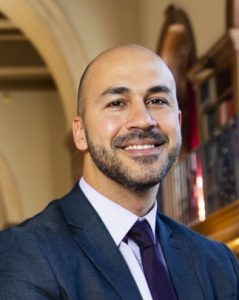 Devin Singh is Associate Professor of Religion at Dartmouth College. We invited him to answer the question “What norms or values define excellent philosophy of religion? as part of our “Philosophers of Religion on Philosophy of Religion” series.
Devin Singh is Associate Professor of Religion at Dartmouth College. We invited him to answer the question “What norms or values define excellent philosophy of religion? as part of our “Philosophers of Religion on Philosophy of Religion” series.
One can imagine a number of theoretical and ethical virtues important to the philosophy of religion. Certainly, virtues such as explanatory power, predictive accuracy, and empirical adequacy are among those that one should seek to cultivate. I contend, however, that other virtues are more central and primary. In this essay, I highlight a cluster of virtues offered by the ethics of care as an important normative framework for thinking about the philosophy of religion.
The ethics of care is an ethical system that puts our relational existence at the starting point of inquiry and that assesses morality in terms of one’s fulfillment of various relational obligations. The ethics of care focuses on the needs and concerns of those with whom one is relationally connected, emphasizing the particularity of the needs of others in their specific social and historical contexts. To the Cartesian cogito, for instance, it asserts that awareness of one’s thinking always manifests in relation to an Other. To the Husserlian epoché it responds that phenomenological reduction always occurs in the context of relatedness. Beyond such structural clarification, it asserts that within the context of such relations emerge concrete and specific needs and obligations, as well as awareness of vulnerability, all of which should shape how philosophical and ethical reasoning might proceed.
Virginia Held (2006), whose work has most programmatically outlined an ethics of care, offers the care of a child as a paradigmatic instance to think through such concerns. Acting morally and ethically in such a scenario stems from vulnerability, affective bonds, relations of mutual dependence, and other senses of obligation that may precede and exceed universalized and abstract maxims of moral virtue. Despite utilizing the child as an exemplary case, an ethics of care is not to be relegated simply to the familial, personal, or private sphere, but has bearing on broader publics including the national and international level. It also bears on matters of justice and, while care and justice cannot be collapsed together, they refine and shape one another in significant ways. Care and concern for specificity of actors and contexts will emphasize restorative and redistributive forms of justice more than retributive. Beyond models of simple fairness or balance, it will emphasize corrective and ameliorative measures that may look imbalanced when contextual differences are ignored.
Leonardo Boff (2008) extends the networks of care to all of creation, asserting that human relatedness occurs within a broader context of reciprocal care with the earth. Such a view raises to prominence the ways that material existence, embodiment, and history remain relational factors that inform thinking. For Boff, “care is a way of being; that is, it is the key way through which the human being structures itself and through which it interacts with others in the world. In other words: it is a way of being-in-the-world in which the relations that are established with all things are founded” (59). Care thus grounds and orients relational existence, from which then proceed ways of thinking and knowing.
An ethics of care as a philosophical system therefore emphasizes relational existence and eschews atomism and individualism. Not only does moral formation not happen in isolation, but the ethical as such is relational. Such ethical relationality puts this view into tension with virtue ethics, which at times imply internalized and individually construed paths of moral formation. The ethical individual—and, originally, the virtuous man (sic)—was the paradigm of ethical excellence. Such a horizon of the good is opposed to moral postures of relatedness that attend to ethical social networks.
In attending to the specificity and particularity of ethical others, the ethics of care also pushes back against the universalism of typical deontological approaches. Maxims such as the categorical imperative commend a universalizable course of action that intentionally denudes the ethical actor of history, society, and culture—not to mention biographical particularities including race, class, gender, and sexuality. Rather, an ethics of care emphasizes that moral action necessarily varies across time and space, that context and the specific needs of the other dictate what the ethical looks like in each situation.
A dominant approach to the philosophy of religion attempts an objective, dispassionate, and removed analysis, with the claim that such a position is the least biased and most accurate. One starts with the reduction, bracketing out the self, its relations, affect, and emotional connections. Only after this can one apply a particular normative ethical framework and value set. The assumption is that a more accurate description of reality can be reached though withdrawal from one’s connections to others and their concrete, lived situation.
The ethics of care belies this approach by questioning the supposed neutrality of its starting point. It challenges the assumption that the disconnected, asocial, isolated individual is an adequate baseline for philosophical and ethical reasoning. Such a posture of existence is actually far from the human norm. Rather, life takes place under circumstances of embeddedness in social and relational networks, mutual dependencies, and the obligations and reciprocities that emerge from and in turn resubstantiate these ties. Furthermore, religiously inflected ethics of care derive injunctions from religious traditions to care for the vulnerable in ways that resonate powerfully with the normative vision of this ethical system. Such approaches might integrate quite well with philosophy of religion approaches that themselves are grounded in or derive guiding principles from certain religious traditions.
The virtues that emerge from this approach, therefore, include a recognition of and commitment to one’s concrete relational ties and the obligations of reciprocal care that arise. This approach suggests that some of the best forms of thinking in the philosophy of religion will emerge from living and reasoning through such concrete instances of encounter and bond, as opposed to from efforts at distance, withdrawal, and objective views from nowhere. Such norms and values are thus existential and ethical as much as epistemological and noetic. They issue the challenge and promise that excellence in thinking and analysis will emerge in full acceptance and embrace of the realities of lived existence, an existence that is always already relationally determined and conditioned by vulnerability, affective bond, interdependence, and the needs of care that inevitably arise.
Works cited:
Boff, Leonardo. 2008. Essential Care: An Ethics of Human Nature. Translated by Alexander
Guilherme. Waco, TX: Baylor University Press.
Held, Virginia. 2006. The Ethics of Care: Personal, Political, and Global. Oxford: Oxford University Press.

